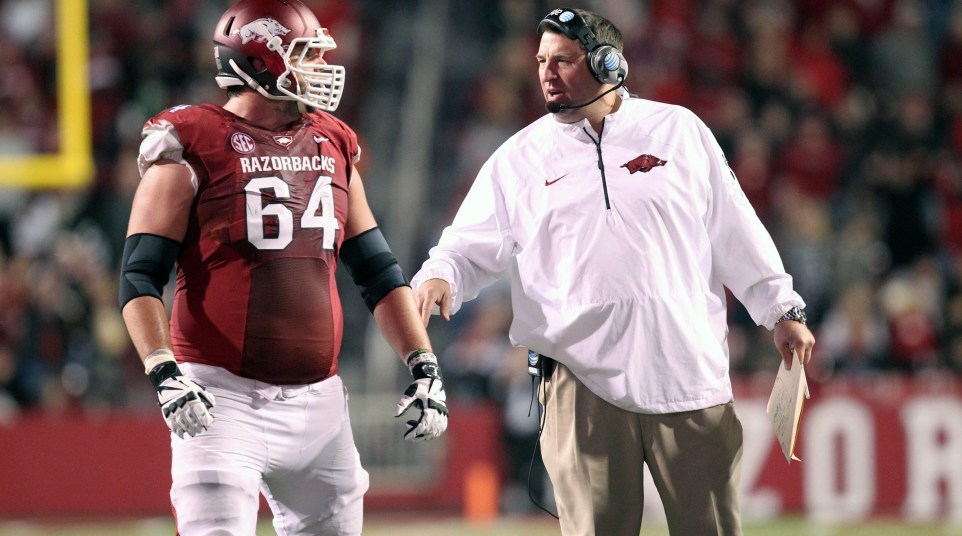Bret Bielema's no-nonsense approach to discipline is commendable
If a star quarterback gets arrested for marijuana possession or implicated for signing autographs against NCAA rules to earn thousands of dollars, major FBS programs find a way to limit the consequences, usually to a half-game suspension.
Show up late to team functions and Bret Bielema won’t even put your name on the depth chart.
Many college football coaches offer lip service to pseudo-parenting, promising families to take care of their sons. Especially for the best players, though, punishment and discipline comes for two main reasons: 1) It’s necessary to avoid public embarrassment and criticism, or 2) To yank the leash, as a pet owner would on a dog, in order to maintain discipline and focus on the football field.
With Bielema, though, there’s a sense that he believes in discipline as a way to encourage his players to be better men, regardless of whether the decisions help the Razorbacks achieve more team success. Or sometimes just because he’s a stubborn, principled man, one unwilling to compromise on basic demands.
Both are commendable.
We don’t know many details, but Bielema recently invited 6-foot-6 receiver Kendrick Edwards to seek a transfer.
Edwards, expected to be one of the team’s top downfield options (on a roster devoid of them), got removed from the program for one week for rules violations. Recently, Bielema extended that suspension for the rest of the spring and gave him permission to talk to other schools, saying Edwards’ issues “are not talent-based, they’re performance-based off the field.”
Again, we don’t know the details, but based on everything that’s been reported, it sounds like Edwards didn’t commit some heinous crime, but just didn’t exhibit a professionalism in the way he went about his business, neglecting responsibilities and disrespecting rules. Bielema has little patience for that.
Recently, defensive end Tevin Beanum got arrested for DWI and minor in possession of alcohol. Beanum was driving with his high beams in the on position in Fayetteville on Feb. 22 at about 2:26 a.m. CT. Police found an open bottle of brandy on the back seat and Beanum smelled of alcohol.
The soon-to-be sophomore wasn’t kicked off the team, but had team activities limited and some additional tasks handed out, Bielema said. Beanum will have to complete university requirements as well as his coach’s to return to the team on a full-time basis. Bielema said he talked to Beanum’s mother to help to determine a proper, or additional, punishment.
“For instance, I’ve taken away his car,” Bielema said. “It sounds simple. I think a lot of today’s problems can be solved by an old school way of thinking. So I picked up the phone and called his mom. We talked about different things. He has to go through the court system and obviously he’ll have ramifications. But I’ve basically banned the use of his car for any time other than when he’s coming over here or going to academics. His car is to remain parked. If he gets pulled over for running through a stoplight at 10:30 at night then he’s violated my rules and there’s going to be an even bigger consequence.”
Bielema also said he suspended wide receiver JoJo Robinson last week. No reason was given.
Robinson is eligible to return to the team Sunday, Bielema said, if he demonstrates a wiliness to change. The coach expects, at midweek, Robinson to return without issue.
Reaching out to parents has been a key part of Bilema’s disciplinary process in his first two years at Arkansas. It seems that he does more than tick the box, doing what’s required. It seems he puts as much time and thought into conduct as he does into defensive scheme adjustments.
He recently explained some of his philosophies on CBS Radio. We’ll step away here and let Bielema do a little preaching. We’re much more inclined to agree with his soap box on discipline and maturity than his latest rant against up-tempo offenses.
“When trouble arises, we go to the people we know can help what we want to get done,” Bielema said Thursday. “We all want the same thing. We all want those kids to come here and have success, more than they can imagine on and off the field. … You want kids to take a step into adulthood. A common phrase we use here is, ‘Men do what they have to do. Children do what they want to do.’
“When you’re in grade school and junior high, you can do what you want to do. You have some responsibilities, but mom and dad aren’t really putting too much responsibility on people who are 15. When you come to college now, you’ve got to start acting like an adult. You’ve got responsibility. You’ve got to make choices in what you have to do, rather than what you want to do. Sometimes, a common result (from contacting parents) is they get an immediate reaction, because they know them better than anybody.
“They can cut off their phone. I think (one player’s) mom cut off his data plan, so he can’t tweet or direct message or Instagram. That’s an easy way to solve a bigger problem. On the same account, just to teach them that being a man is a lot harder to do than say. I think that’s a big part of us to make them grow up.”

